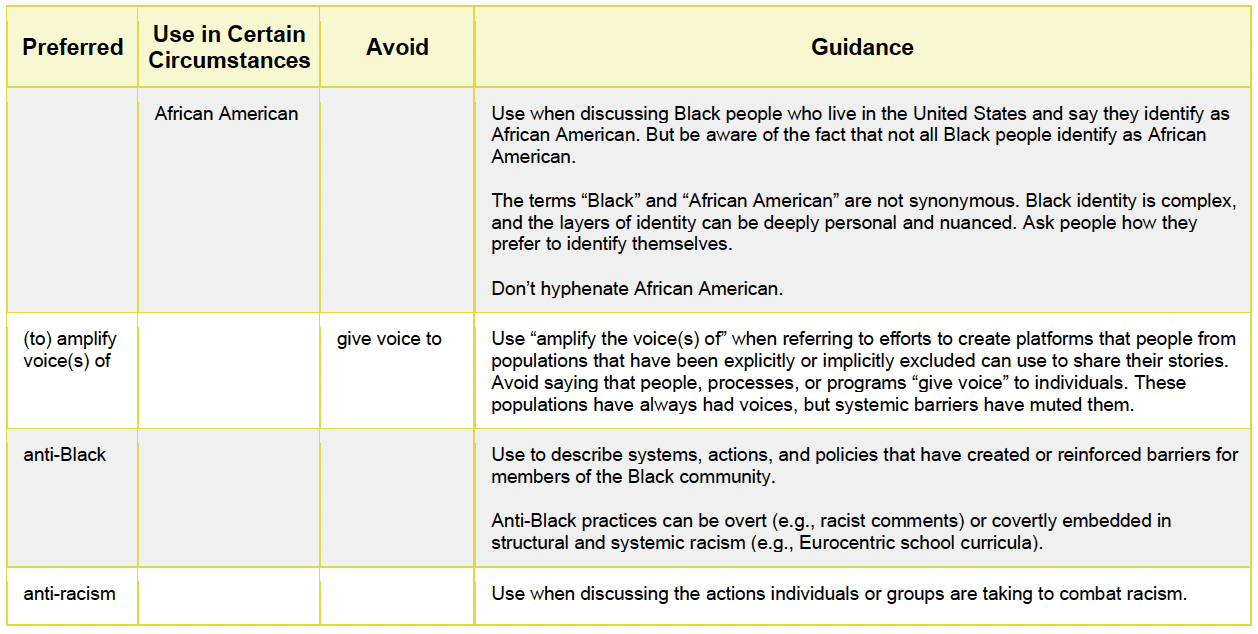
New JFF Guide Offers Advice on How to Talk About Race
July 13, 2023
At a Glance
JFF’s Center for Racial Economic Equity introduces a valuable resource for employers, educators, and other leaders throughout the work and learning ecosystem who are committed to advancing racial equity through the use of asset-based language.
The words we use to talk about race can, intentionally or unintentionally, either reinforce or help break down barriers that Black people face in U.S. society.
At work, in school, or in any other setting, language can exclude or devalue individuals and perpetuate inequities. But language can also educate, empower, and drive positive change.
At Jobs for the Future (JFF), we strive to do the latter: use language that drives positive change. As part of what we call our Language Matters journey, we’re committed to using asset-based language—words and phrases that empower people by emphasizing their strengths and potential, rather than their challenges. (Visit our website to learn more about JFF’s Language Matters guidelines.)
We believe it’s especially important to use asset-based language when discussing race, because one of our core commitments is to help build a world where race is no longer a determinant of education and economic outcomes.
While the principles we’ve embraced apply to members of all of the populations JFF’s work touches, we believe it’s especially important to use asset-based language when discussing race, because one of our core commitments is to help build a world where race is no longer a determinant of education and economic outcomes.
And likewise, while we believe that using asset-based language in any context can advance racial equity throughout society, we think it’s important to use asset-based language in education and workplace settings, because ensuring that Black learners and workers feel a sense of inclusion and belonging at school and on the job is essential to ending occupational segregation and accelerating Black economic advancement as highlighted in JFF’s Center for Racial Economic Equity’s Call to Action.
We further believe that leaders who use asset-based language as part of a commitment to building diverse, equitable, and inclusive organizations will find that this approach not only benefits Black learners and employees but also leads to improvements in retention rates and other organizational goals.
Microaggressions Fuel Turnover
One key setting where it’s vital to adopt asset-based language is the workplace. Labor market research suggests that the language people use at work can have an impact on their colleagues’ feelings of loyalty to their employers and on their sense of belonging.
In a recent Indeed survey of 615 Black workers at U.S. organizations, 49% of respondents said they’re either actively looking for a new job or are considering leaving their employers. Of those, 43% said they’re doing so because they’d experienced microaggressions on the job. Given that Gallup reports the cost of replacing an employee can range from one-half to two times the employee’s salary, using asset-based language in the workplace could pay off for employers by reducing microaggressions and the turnover that stems from a hostile work environment.
Research by McKinsey and Company found that business leaders who want to advance racial equity in the workplace face a systems-level challenge and must assess all aspects of their operations to identify and address problems ranging from structural inequities to individual behaviors. One way to promote and cultivate individual behaviors that can improve support for Black workers throughout the enterprise is to help all employees understand how using asset-based language can create a more inclusive culture.
A Guide to Language That Drives Positive Change
JFF’s Center for Racial Economic Equity has developed a resource that can help leaders promote inclusion in their language at work and beyond: The Language of Racial Economic Equity: An Asset-Based Guide to Advance Black Learners and Workers. Informed by Black-identifying leaders across JFF, this guide offers practical advice and insights for organizations and individuals interested in using asset-based language or learning more about key racial equity terms and the evolution of language pertaining to race.
The guidance we offer . . . reflects the fact that Black identity is complex, deeply personal, and nuanced.
The guidance we offer in The Language of Racial Economic Equity reflects the fact that Black identity is complex, deeply personal, and nuanced. And recognizing that complexity, we aren’t positioning the guide as a fully comprehensive or universally definitive source of truth. However, we do believe it’s a valuable complement to other reference materials for leaders that are making an effort to use more inclusive language in their organizational messaging and day-to-day operations.
Since 2020, executives across the country have publicly stated that they’re redoubling their commitments to promoting diversity, equity, and inclusion, and many have pledged financial support to racial economic equity initiatives. We believe an intentional decision to use language that promotes inclusion rather than reinforcing barriers is essential to every organization’s equity strategy. If you share that commitment, be sure to download a copy of The Language of Economic Equity.
A Preview of the Guide
Here are a few examples of the 24 entries in the guide to give you an idea of the types of words, phrases, and terms it covers and the type of advice it offers to help you use and promote asset-based language in your conversations regarding Black people:
